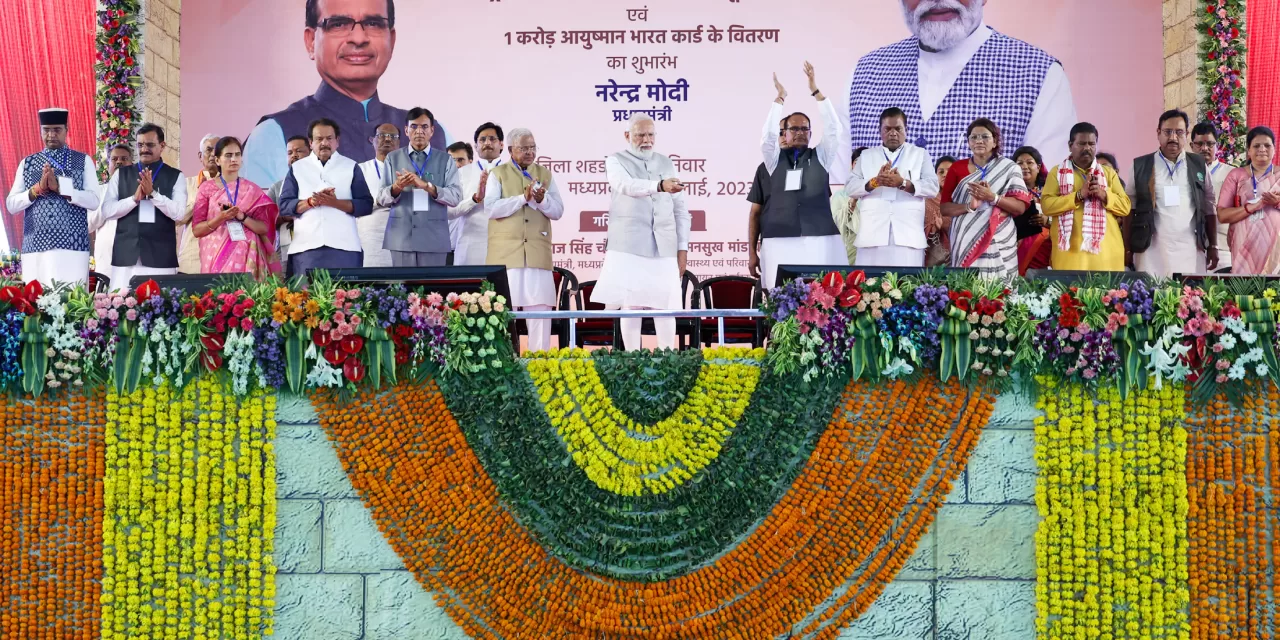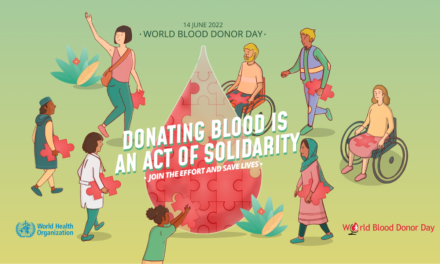“Sickle Cell Disease is a disease that impacts tribal sections of societies significantly. The government is committed to eliminate the disease before India celebrates it’s Amrit Kaal in 2047.” This was stated by the Hon’ble Prime Minister of India, Shri Narendra Modi as he launched the National Sickle Cell Anaemia Elimination Mission (NSCEM) in Shahdol, Madhya Pradesh today. Dr Mansukh Mandaviya, Union Minister for Health and Family Welfare, Shri Mangubhai C. Patel, Governor of Madhya Pradesh, Shri Shivraj Singh Chouhan, Chief Minister of Madhya Pradesh, Dr Bharati Pravin Pawar, Union Minister of State for Health & Family Welfare, Prof. SP Singh Baghel, Union Minister of State for Health & Family Welfare, Shri Faggan Singh Kulaste, Union Minister of State for Rural Development and Steel, Smt Renuka Singh Saruta, Union Minister of State for Tribal Affairs, and Shri Bishweswar Tudu, Union Minister of State for Tribal Affairs, were also present at the event.
Addressing the gathering, the Prime Minister said that today marked a landmark in Shahdol, as with the initiative of NSCEM, and the distribution of Ayushman Bharat cards, the country comes closer to prioritizing the health of tribal communities. The Prime Minister said that he had been working with tribal communities since before he became the Chief Minister of Gujarat, and understands the debilitating impact the disease has on the human body.
The Prime Minister stressed the need for everyone to contribute to eliminate the disease, whether it is the government, the health worker, or the citizens themselves, He further said, “The National Sickle Cell Anemia Elimination Mission takes a comprehensive approach towards combating sickle cell disease as the impact of a disease is not felt by the patient alone, but by the whole family. NSCEM combines both screening and awareness strategies to ensure early detection and treatment while promoting education about the disease as people may not be aware that they suffer from this diseases, and may unintentionally transfer it to the next generation, hence the role of screening becomes even more important in this regard.”
The Prime Minister highlighted the efforts taken by the government to reduce the impact of diseases in the country, whether it was bringing down numbers of Kalaazar from 11,000 in 2013, to under 1000 today, or bringing down malaria cases from 10 lakh in 2013 to under 2 lakh today. Similarly, leprosy cases have come down from 1.25 lakh to 70-75 thousand. In this he also highlighted how his government is determined to eliminate the spread of tuberculosis by 2025. He further said, “These are not just numbers, when the impact of illnesses reduce, the pain, struggle, fear, and death that people otherwise face is also reduced.”
The Prime Minister launched the National Sickle Cell Anaemia Elimination Mission, as well as released the guidelines for Sickle Cell Anaemia Elimination Mission. He further launched training modules for primary, secondary, and tertiary care including medical officers, staff nurses, Community Health Officers, Auxiliary Nurse Midwives, and Accredited Social Health Activist workers. He also released an awareness module for Sickle Cell Disease for Non-Health Functionaries, Parents, Teachers, as well as a counselling module for patient, care givers, and pregnant women.
At the event, the Prime Minister handed over Sickle Cell Genetic Status Cards to beneficiaries. He also launched distribution of about 3.57 crore digital cards to Ayushman Bharat Pradhan Mantri Jan Arogya Yojana (AB-PMJAY) beneficiaries, with 1 crore cards being distributed physically to the beneficiaries in Madhya Pradesh.
Dr Mansukh Mandaviya, Union Minister for Health and Family Welfare, called the day historic, and said, “Under the visionary leadership of Prime Minister Shri Narendra Modi, the Ministry of Health and Family Welfare, and the Ministry of Tribal Affairs the National Sickle Cell Anaemia Elimination Programme was developed to ensure that the health risks faced by our tribal communities are significantly reduced.”
He further said, “The elimination programme reflects the government’s Intent and determination to eliminate the spread of Sickle Cell Diseases. Across 278 districts of India, screenings will be done for people between 0-40 years to stem the further spread of the disease.” As the spread of Sickle Cell Disease is genetic in nature, the Minister said that people from the high burden states should match the Sickle Cell Genetic Status Cards before marriage to ensure that the disease is not transferred to the next generation. He further said that the role of society is essential for the programme to be successful, “Sabka Saath, Sabka prayaas can stop the spread of Sickle Cell Disease.”
With regard to the Ayushman Bharat-PMJAY cards distributed today, the Minister said, “Previously only the rich could access quality treatment, now there is equity in healthcare where the poor can access the same quality of healthcare as the rich without fear of the expense.” He further remarked that the launch of Ayushman Gram Sabha across 25,000 villages today shows the government’s commitment to creating awareness about affordable and quality healthcare to the poor.
About National Sickle Cell Anaemia Elimination Mission:
The National Sickle Cell Anaemia Elimination Program, introduced in the Union Budget 2023, focuses on addressing the significant health challenges posed by sickle cell disease, particularly among tribal populations of the country. Sickle cell disease (SCD) is a chronic single gene disorder causing a debilitating systemic syndrome characterized by chronic anemia, acute painful episodes, organ infarction and chronic organ damage and by a significant reduction in life expectancy. Implemented in 17 high-focus states across the country, this program aims to improve the care and prospects of all sickle cell disease patients while reducing the prevalence of the disease. The 17 states are- Gujarat, Maharashtra, Rajasthan, Madhya Pradesh, Jharkhand, Chhattisgarh, West Bengal, Odisha, Tamil Nadu, Telangana, Andhra Pradesh, Karnataka, Assam, Uttar Pradesh, Kerala, Bihar, and Uttarakhand.
The program is executed in a mission mode as part of the National Health Mission (NHM), aims to eliminate sickle cell genetic transmission by the year 2047, showing a long-term commitment to eradicating the disease.
Over a period of three years, spanning from the fiscal year 2023-24 to 2025-26, the program targets screening approximately 7.0 crore people. This ambitious goal highlights the program’s dedication to reaching a large portion of the population, promoting early diagnosis and intervention.











